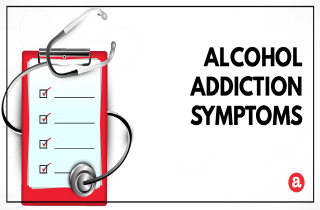Signs of alcohol problems?
Do you suspect that someone close to you is struggling with alcohol addiction? Do you believe your own drinking is becoming a problem? Learn to look for the common signs and symptoms of alcohol addiction. More on behavioral, physical and emotional signs of alcohol problems here. Plus, a section for your questions about alcohol problems, alcohol withdrawal syndrome , or how to treat alcohol problems at the end.
Alcohol addiction signs are more common than you think
Becoming addicted to alcohol is not only possible, but fairly common. An estimated 9-10% of people who drink alcohol can develop the compulsion to continue drinking, even to their own detriment. Alcohol addiction affects people of all race, ages and class. But when family members or close friends struggle with alcohol addiction, it is terrible for the people around them. It can be and emotional roller coaster ride. Understanding the reasons for an alcoholic’s actions can be difficult. It is easy to find yourself frightened about their safety as well as your own. You are not alone!
Symptoms of alcohol addiction
To evaluate possible alcohol addiction, look for varied symptoms. Does alcohol affect the brain? Yes, but signs of alcohol addiction develop over time and may be difficult to spot at first. Ask yourself a number of questions about the person you worry about. “Does the person drink more while out than in the past?” “Does the person drink more than others but not show the same level of drunkenness?” “Has drinking started to impact home, work, or social life?” Also,
Here are some other symptoms of alcohol addiction to be aware of. An alcoholic can:
- Become violent when drinking
- Become aggressive when asked about drinking
- Continue to drink, even when health, work, or family are affected
- Drink alone
- Have poor hygiene
- Lose the ability to control, stop, or reduce alcohol intake
- Make excuses to drink
- Miss work or school due to drinking
- Need to use alcohol on most days to get through the day
- Neglect eating or eat poorly
- Show decrease in school or work performance because of drinking
- Shake in the morning or after periods when they have not a drink
- Stop taking part in activities because of alcohol
- Stop caring about or ignore how they dress
- Try to hide alcohol use
A word about alcohol tolerance – As the body gets used to alcohol, it requires more alcohol to achieve the same initial effect. This mean that a person will need to drink more to get the same feeling or drink longer for the feeling to last the same length of time. Tolerance is a sneaky symptom and is easy to not notice until months into a possible addiction.
Alcohol withdrawal symptoms – When the effect of alcohol wears off, your loved one may show signs of withdrawal symptoms. These include being jumpy or shaky, having a headache, struggling with insomnia or being irritable, depressed or drained of energy. In more severe cases, alcohol addicts can experience hallucinations, confusion and seizures during withdrawal. These are extremely serious and need immediate medical attention.
Alcohol addiction symptoms: Can they be treated?
Yes. The good news is that there is help for alcohol addiction symptoms. The problem is that alcoholics rarely want to admit that there is a problem. In order to help an alcohol, consider planning an intervention. During an intervention, you confront a problem drinker and talk about how their drinking has impacted you, your life, and your relationship. Encourage alcoholism treatment and offer to help them find local resources.
What kinds of alcohol addiction treatment options are available? Treating alcohol addiction symptoms often comes in three stages: detox, stabilization, and psychotherapy.
1. Detox
The first stage of alcohol addiction treatment is withdrawal and detox. Detox from alcohol should be completed under medical supervision as it is painful and there are many behavioral changes possible. Under supervision, the changes can be monitored to make sure the patient is healthy at all times. Medications may be given to help ease the pain of the withdrawals.
2. Physical stabilization
After detox, an alcoholic goes through the physical stabilization phase. During this time, doctors can address and treat protracted withdrawal symptoms, especially underlying anxiety, depression or other mental health disorders. Once a person’s body is fully recovered from withdrawal and the long term effects of alcohol abuse, they can start to address mental compulsion to drink..
3. Psychotherapy
Psychotherapy is the basis of alcohol rehabilitation and recovery, where psychologists can help a patient understand more about their addiction and the steps to take to prevent a relapse.
Treating alcohol addiction symptoms
Alcohol addiction is usually treated in either an outpatient or inpatient facility. Each one offers pros and cons. Inpatient residential treatment offers 24/7 support that many severe alcoholics need. There will be medical supervision at all times to help with detoxification and withdrawal stage, which can be one of the most difficult times for people. Inpatient treatment also includes education about the disease model of addiction and psychotherapy
Outpatient treatment offers psychotherapy and support groups from other alcoholics, such as through Alcoholics Anonymous, and treatment with psychologists. The outpatient support can offer ongoing support while inpatient treatment is there for more immediate recovery or removal from an addict’s environment.
Signs of alcohol addiction questions
If you have questions about alcohol addiction and the process of treatment, please comment below. We are happy to help as much as we can. Likewise, if you have a story about your own addiction or have carried out an intervention for a friend, please comment and share your experience. We try to respond to all comments personally.









Related Posts